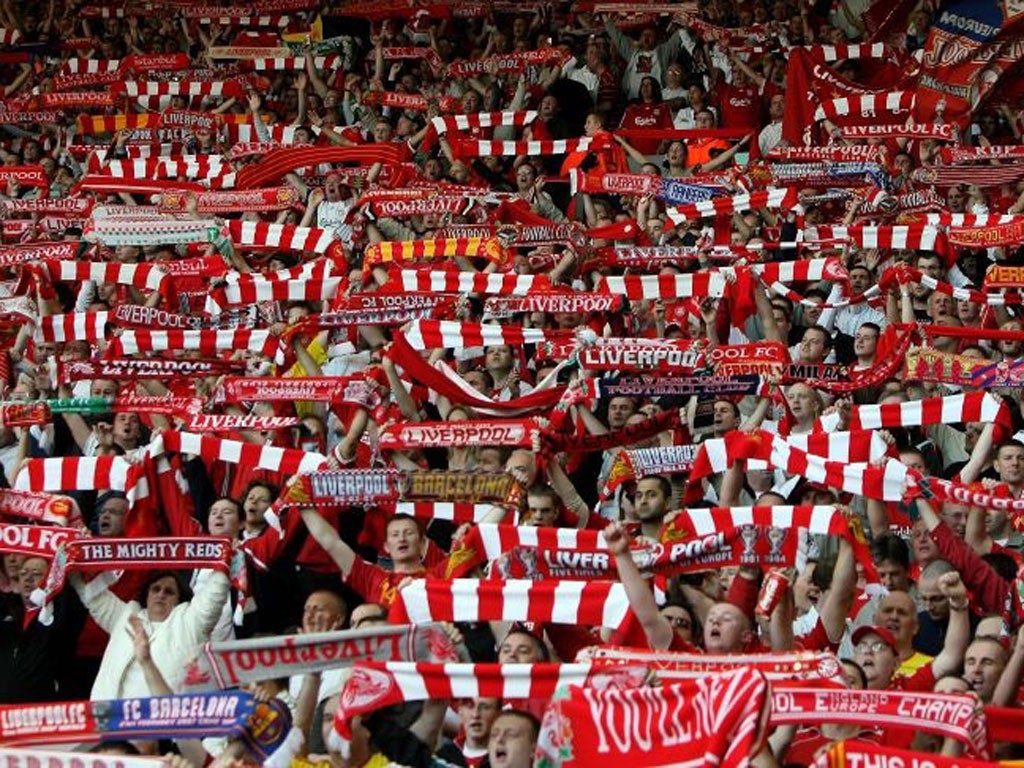Was Liverpool the home of the singing Sixties?
New film looks at origins of crowd chants – with Merseyside as pacemakers

The most famous football anthem of all will ring around the new Wembley for the first time today when Liverpool contest their first silverware in north London since 1996. 'You'll Never Walk Alone' will bellow out from beneath Lord Foster's arch, although – whisper it among Anfield loyalists – the song that the Kop made their own after Gerry and the Pacemakers took it to No 1 in November 1963, might well have been heard first at Old Trafford, home of their arch rivals Manchester United.
This is the claim of Jane Hardwick, a grandmother from Staffordshire who recalls starting a rendition of it during an evening match shortly after the Munich air disaster in 1958. The then teenage schoolgirl had performed in Carousel, the 1945 Rodgers and Hammerstein musical featuring the song, with her local operatic society and with emotions raw, "it just seemed an appropriate song and I started singing it and it just caught on," she said this week.
Of course, Anfield was where the song became a footballing hymn, and how this came to be is explored in a documentary film, Walk On, being made by Liverpool production company Tabacula. Through interviews with fans and players of Liverpool and Everton in the early Sixties it will consider Merseyside's central role in the birth of the modern football song and there is some persuasive contemporary evidence. In 1964 BBC's Panorama visited Anfield to capture 28,000 swaying bodies singing 'She Loves You'.
Arthur Hopcraft's classic 1968 book on the English game, The Football Man, noted how the 1960s had brought "rehearsed chants and verses... created in Liverpool, where the city character, with its pervading harshness of waterfront life, and bitterly combative Irish exile content, was given a sudden flowering of arrogant expression with the simultaneous rise of its pop musicians and of both its leading football teams."
Ian Callaghan, a member of the first Liverpool team to win at Wembley, in the 1965 FA Cup final, concurs. "The Beatles, Gerry and the Pacemakers, all that Liverpool sound was there, plus the football was coming up so the combination of the two was just fantastic," says Callaghan, who recalls the Kop singing 'Careless Hands' to Leeds goalkeeper Gary Sprake after he threw the ball into his own goal.
The origin of football chants is no precise science but after the Anfield crowd began singing 'You'll Never Walk Alone' in the 1963-64 campaign, its status appears to have been sealed in the week of the 1965 Cup final when Bill Shankly selected it on Desert Island Discs.
In the same period, Everton adopted the Z Cars theme they still run out to. Based on a traditional folk song, 'Johnny Todd', it was written for the Z Cars TV series – filmed in Kirkby – and entered the charts 50 years ago next month.
Reflecting on the changing terrace culture of the Sixties, John Williams – a sociology lecturer at the University of Leicester and the author of Red Men, a recent book on Liverpool's history – connects it with "the first signs of a national youth culture". Football crowds, he says, had previously sung "local popular songs", often connected with a Cup run or favourite player – until the early 1970s the preamble to a Wembley final included an hour of community singing, with favourites such as 'Roll Out The Barrel' led by a man in a white suit, in contrast to the cheeky "God save our gracious team" first sung by fans from Merseyside in front of the Queen in the mid-Sixties.
For Williams, the younger generation separated themselves from their older counterparts with "songs that only really young supporters might know. You also begin to get supporters chanting at each other and becoming abusive".
Five decades on, British football crowds can certainly be abusive but are still capable of impressive good humour; witness Manchester City fans chanting "You're not incredible" at Porto's captain Hulk on Wednesday.
They are still coming up with new songs too, even if, as Williams says, creativity is threatened by "this insistence that marketing people know how to create an atmosphere around a stadium".
Anyone familiar with the new Wembley's deafening PA system will agree. 'You'll Never Walk Alone' is all well and good, but if Liverpool are victorious today, will they be allowed to sing it alone?
Chants are a fine thing
Newcastle fans are thought to have first sung the 19th century folk song 'Blaydon Races', at the 1924 FA Cup final. West Ham fans adopted 'I'm Forever Blowing Bubbles' after it became a music hall hit in the 1920s.
Birmingham's 'Keep Right On To The End Of The Road' is another music hall number that fans took up during their 1956 FA Cup run after hearing winger Alex Govan sing it on the team bus. Tottenham's early Sixties successes unfolded to the strains of 'Glory, Glory Tottenham Hotspur'.
Chelsea fans began singing 'One Man Went To Mow' on a 1981 pre-season trip to Sweden because a supporter, Mickey Greenaway, had a cassette of children's songs. After facing Celtic in the 1997-98 Uefa Cup, Liverpool fans turned 'The Fields of Athenry' into "The Fields of Anfield Road".
Simon Hart
Join our commenting forum
Join thought-provoking conversations, follow other Independent readers and see their replies
Comments
Bookmark popover
Removed from bookmarks